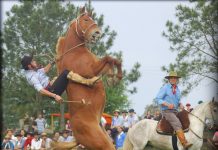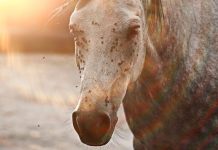The Mustang horse is considered a wild horse that roams freely in the wild in parts of the United States. In the past, the population had been reduced by slaughtering captured animals.
Due to animal welfare, this came to an end, and meanwhile, the population in nature is to be controlled through worldwide adoptions. With a maximum height of 145 centimeters, it is one of the small horses.
Origin and breed history

Although the origin of the Mustang horse is given as the USA, the origin of this horse breed is in Europe, to be more precise: in Spain, where it is derived from domestic horse breeds there.
From Spain, today’s Mustang horse found its way through settlers who emigrated to America in the 16th century.
Due to its sturdy shape and compact dimensions, the Mustang horse was used as a work and traction animal. They were mainly used by the Indians as mounts.
Because many of the “power packs” broke out of their stables and found their way into freedom, the Mustang horse increasingly developed as a wild horse living in the wild. The regions where they still sometimes reside today include the vast prairies of Nevada, Montana, Oregon, and Wyoming.
The appearance of the Mustang horses
What is striking about the Mustang horse is the compact and relatively small exterior. The breed is very muscular and strong. They have a so-called Ramskopf, in which the bridge of the nose is clearly bent outwards.
The neck is set low compared to a German warm-blooded animal. The withers are only slightly pronounced. The back of a Mustang horse is heavily muscled.
The croup drops significantly towards the tail. The legs are quite short and sinewy, although strong muscles are already developed above the forefoot roots or ankle joints. The hooves are hard and normally shaped.
Their fur is dense and is particularly noticeable in healthy Mustang horses. They come in all sorts of coat colors and badges. There are also piebald Mustang horse variations.
Size: 130-160 cm
Weight: 300 – 400 kg
Origin: USA
Lifespan: 15-20 years
Color: All colors, drawings, and checkered colors
Suitable as: Leisure, Western
Temperament and essence
A Mustang horse is one of the frugal animals that can, however, also be very stubborn and stubborn. They do not shy away from confrontation in order to demonstrate or enforce their independence.
They are considered to be very fiery and heated beings who can quickly become restless. They are very popular due to their high endurance potential and almost incomparable resistance.
You are very stable in character and strong-willed, but in essence, you show yourself to be with a certain degree of distrust and cautious behavior. Once they have gained trust, they are very loyal companions and can display versatile character traits.
Husbandry and nutrition
The Mustang horse needs a posture in which a lot of exercise, activity, and, ideally, power is possible. The power pack should move its muscles sufficiently daily and be able to use its energy through long gallops.
Accordingly, large areas of exercise should always be available for a Mustang horse. A pure stable is not for this breed, because this accumulates its enormous energy and the chance is high that it breaks out and the Mustang horse reacts accordingly uncontrollably.
In the wild, the Mustang horse feeds exclusively on grasses and herbs. It can be kept all year round in lush meadows. Hay feeding can also take place.
Oats are often fed to stables. It is essential to ensure that the amount is ideal, which is based on the calorie consumption of the horses. This is determined by the movement/work of the horses.
The Mustang horse, which does not have a lot of movement and is challenged in terms of strength and energy, collects even more energy from too many oats, which can lead to problems in handling. Therefore, it is important to approach oat feedings carefully, if at all necessary.
On the other hand, a daily ration of linseed has a beneficial effect on the Mustang horse. These optimize the digestive function of the sometimes restless horse.
Education and care
Mustang horses have a good grasp of things and quickly learn what they can theoretically train well, were it not for their fiery temperament and individual will.
Patience is just as important in the upbringing as a consistent pulling through of the upbringing. When riding in, they defend themselves with all available means and their enormous stamina makes it difficult for riders to tame them under the saddle.
In principle, the one with the “longer breath” wins here. As soon as the Mustang horse realizes that it is unsuccessful with its defense, it will give way.
Then it presents itself as a very eager-to-learn comrade who quickly learns even the most difficult dressage lessons, which can also make him an ideal competition horse.
The most important thing in dealing with a Mustang horse is building trust. Bad experiences with people can ruin any basis for a good upbringing for a lifetime.
Therefore, a Mustang horse is always to be treated carefully and caring, but still decisive. If their temperament is tamed and trust is created, the Mustang horse proves to be a courageous and with a little patience, also people-related horse.
Caring for a Mustang horse is the same as for any other horse. Grooming, hoof care, mane and tail care are just as much a part of daily care as cleaning eyes and nostrils.
Health and Typical Diseases

Because the Mustang horse originally only lived on dry ground, it tends to develop hoof rot when kept on lush meadows and in regions with frequent rainfall.
This can be prevented with appropriate means, such as hoof tar. A load row is observed more often in the Mustang horse.
This is a hoof inflammation caused by a lot of grazing on hard ground or long stalls on hard concrete.
Due to the extensive need for exercise outdoors, deer stress can occur especially after very rain-free summer months, when the ground has dried out from the heat and is accordingly hard. Regular blasting with water prevents this.
Otherwise, they are considered to be extremely robust and resilient. Only colic haunts them more often, especially when they are nervous, restless, and are fed or eat in that state.
The life expectancy of the Mustang horse
If a Mustang horse is kept and well cared for under optimal conditions, it has an average life expectancy between 17 and 20 years.
Mustang horse buy
In Europe, there are only a few breeding farms, although these are an ideal address for buying a Mustang horse.
As a rule, the parent animals of foals can be viewed here and, ideally, conclusions can be drawn about possible peculiarities in nature. The breeders often also have older Mustang horses for sale, from yearlings to three-year-olds.
Foals offer the cheapest option, while in the case of three-year-olds, the purchase price is determined between broken-in and unrestrained horses in addition to special ancestry/breeding peculiarities.
Depending on the breeding traits, age, and training, you should expect a purchase price between $2,500 euros and $25,000. Successful competition horses can also be offered well above the price.
Another possibility is available to you to get through intermediaries to Mustang horses that have been caught in the US prairie and are waiting in reception centers for their adoption.
Here you usually have to pay lower purchase prices, but you also have to deal with the transport, customs, and medical factors as a result of importing from abroad.
Caution is advised in public horse markets. Here dubious salespeople can occasionally be found, from whom, in the worst case, you might find a sick Mustang horse or one that makes normal handling impossible due to bad experiences, for example.
It is better to refrain from buying on the public horse market if you do not know the seller personally if you cannot see the Mustang horse under normal conditions outside of the hustle and bustle of sales or at least receive trustworthy recommendations for the seller from horse friends you know.
Buying a Mustang means a lot of commitment and time investment for you. You cannot leave them to their own devices, they need your attention every day.
In addition, you should not ignore the costs that will come with buying a horse. The cost is one thing, but what if the Mustang horse gets sick?
A few hundred euros in veterinary bills can quickly become due and the necessary operations can even cost up to three-digit figures.
To ride out on public roads, you need liability insurance and appropriate stickers, which you have to buy every year.
Forage, stable accommodation, costs for grazing, the farrier every six to eight weeks, and accessories such as saddle, cleaning equipment, and halter are just a few examples of what you can expect financially with the purchase of a Mustang horse.
Decision support
Do you have experience in handling and training horses? Are you a patient person who can assert yourself, but also has a diplomatic disposition?
Are you looking for a challenge and an extremely loyal and loving friend by your side who does not completely submit to you, but has a temperament and never lets it get boring?
If you still have enough time and financial resources for maintenance and possible unplanned ancillary costs, the Mustang horse is the ideal choice for you – whether as a leisure or competition horse.
With a Mustang horse, the term “freedom” has a very special meaning that you can live out together with your new companion. But it needs your undivided attention.
If you only have time occasionally and do not deal extensively with the Mustang horse, you will never experience how wonderful the feeling is to have such an uncompromising friendship with a horse that loves you unconditionally and goes through the fire for you like none other breeds of horse.
Buy a Mustang horse only if you can keep the conditions for an optimal posture and the best possible handling because only then does the Mustang horse expect a life that is worth living and has more than earned.
And if you don’t have extensive experience in keeping and handling horses yourself, you don’t have to do without a purchase entirely.
There are many experienced horse lovers who are particularly knowledgeable about the breed and who are at your side with advice and assistance.
FAQ: Frequently asked questions

How much does a Mustang horse cost?
Adopting a Mustang in America doesn’t cost a lot of money. However, there are some costs involved before the Mustang is allowed to leave the country, is ready to fly, and is flown to Europe.
The adoption price of a Mustang at the BLM is $ 125. In addition, there are costs for the training and the stay in America for a year. In total, you have to reckon with costs of around $ 4000.






























